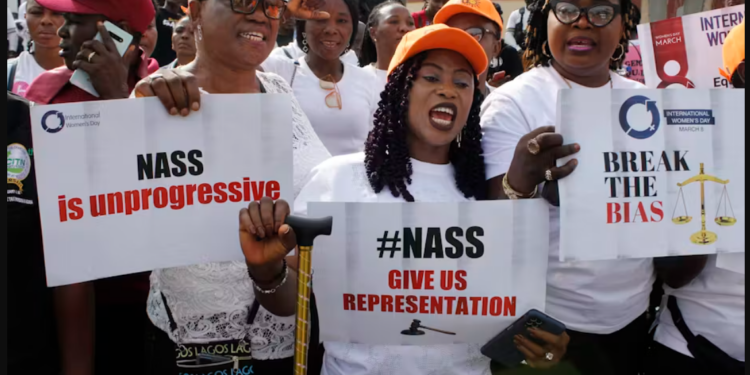The sun rose brightly over Ondo State, casting a golden glow on the streets as residents prepared for an important day. It was time to elect their 19th governor, and the air was thick with a mix of anticipation and determination. Across the state, voters turned out in their low numbers, ready to exercise their democratic rights.
The Independent National Electoral Commission (INEC) announced ahead of the election that 2,053,061 registered voters would decide the outcome across 2,846 polling units in 18 local government areas. As the election commenced, one thing was notably clear. Amidst the ink-stained thumbs and voters scrutinising the ballot papers, one thing stood out: the strikingly low representation of female candidates.
The November 16 Ondo State Governorship election, which had 18 governorship aspirants—all men with no woman, highlighted a glaring lack of women’s political inclusion, further deepening the gender gap in Nigerian politics.
Ondo women in political participation
Women formed 49.64 per cent (1.019 million) of registered voters in the Ondo election, slightly lower than their male counterparts: 50.36 per cent (1.034 million males), 35.41 per cent (726,944 youths), and 35.17 per cent (721,982 middle-aged individuals).
Despite this percentage of women voters – which shows their involvement in the electoral process, only two women appeared on the ballot paper as deputy governorship aspirants. Labour Party and Social Democratic Party (SDP) candidates, who are not major political parties in the state selected women as running mates.
Aside from the inclusion of women in the governorship race, women’s acceptance in primary elections remains a lingering issue. While the Peoples Democratic Party (PDP) had no female representation in the primary election, the All Progressive Congress (APC) had two aspirants, who garnered low results, making it impossible for them to be flagbearers. Also, only two parties of the governorship aspirants selected women as running mates.
A political expert and former Cross River State sports commissioner, Gladys-Otemnep Festus sees this as a problem. According to her, any society interested in growth must engage women, and allow them to participate and occupy high office places.
“They are naturally administrators and so not giving them opportunity could mar a lot of things and it might not be too good for us as a society,” she added.
A reflection on a broader scale
This reality reflects the country’s current political situation. A report by the Carnegie Endowment for International Peace revealed that Women’s representation in Nigerian politics has been on a downward slide since 2011, emphasising that the 2023 elections confirmed the expectations of poor outcomes for women.
Despite women constituting 49.3% of Nigeria’s total population, they only managed to secure 4.69% of the executive and legislative positions at the federal and state levels in the elections held between February and March 2023.
In the 2023 National Assembly elections held on 25 February, 17 women were elected into the 10th National Assembly of the upper and lower chamber. These women were among the 286 women who competed in the party primaries for the 360 House of Representative seats and the 92 who contested for the 109 Senate seats, resulting in a 3.62 per cent representation for women in the 10th Assembly.
The Carnegie Endowment for International Peace, while relying on the 2023 data from the Inter-Parliamentary Union (IPU), noted that Nigeria lags behind many other similarly positioned states in sub-Saharan Africa, falling far short of the 26 percent regional average of women in national parliaments.
While this issue still lingers, the underrepresentation of women in political participation has gained root due to the patriarchal practice inherent in our society. The national average of women’s political participation in Nigeria has remained 6.7 percent in elective and appointive positions, which is far below the Global Average of 22.5 percent, Africa Regional Average of 23.4 percent and West African Sub Regional Average of 15 percent.
Also, no female has been elected president in Nigeria’s history. For the presidential race in 2023, only one candidate, Chichi Ojei of the Allied Peoples’ Movement (APM), appeared on the ballot paper. This was a reduction of six women who were featured on the ballot paper as presidential candidates in the 2019 election.
Damilola Agbalojobi, political scientist and gender specialist, noted that the mandatory expression of interest and nomination forms required by political parties to run for positions have led to the underrepresentation of women in Politics.
She added that “election campaign costs are exorbitant unpaid labour burdens, unequal inheritance rights and outright discrimination also mean that women are less likely to be able to afford to follow through the process of getting leadership positions.”
Solutions despite obvious challenges
Having women represented in higher political offices has been a major hurdle. In March 2022, the national assembly rejected a constitutional bill seeking to create special seats for women in the federal legislative arm.
The bill, titled ‘Bill For an Act to alter the provisions of the Constitution of the Federal Republic of Nigeria, 1999 to provide for special seats for women in the National and State Houses of Assembly; and for related matters,’ was thrown out despite advocacy from the then-First Lady of Nigeria, Aisha Buhari.
Also, the National Gender Policy in Nigeria has not been achieved. The policy was formulated in 2006 to promote a 35 percent affirmative action for women in all governance processes. Despite this policy being recognised, Nigeria has not achieved the proposed allocation of 35% of legislative seats and political party leadership positions to women.
For women to effectively get involved in politics, Gladys wants the 35% gender policy to be fully implemented. She said this would make women not just participate in politics, but be in higher positions.
“If this can be considered, and bring more women into places of authority, I think there will be a reformation in our economy and the entire system”




Discussion about this post